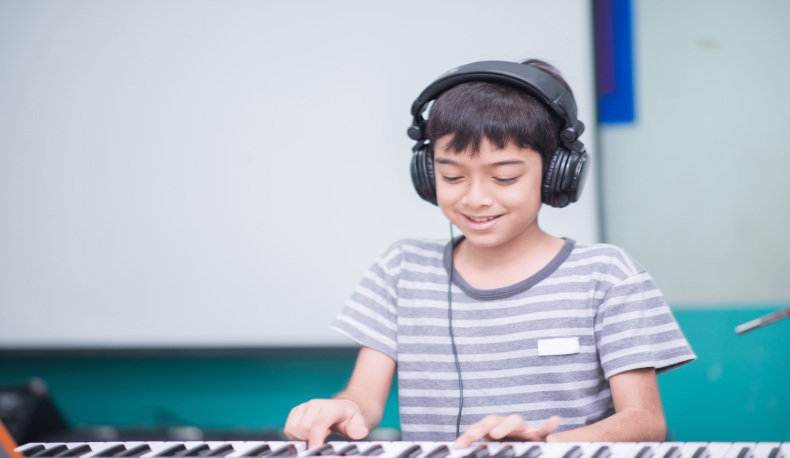
Why Music Education Improves Cognitive Skills in Children: A Guide for Singaporean Parents
Cognitive skills are the building blocks of a child’s ability to think critically, process information, and solve problems effectively. These skills are essential for academic success and lifelong learning, making their development a key focus for parents and educators alike. One highly effective way to nurture these abilities is through music education, which goes beyond artistic expression to enhance intellectual growth and creativity in children.
In Singapore, where holistic education is a cornerstone of the learning system, parents are increasingly turning to music as a tool for well-rounded development. The benefits of music education in Singapore are widely recognized, from improving memory and focus to fostering emotional intelligence. By incorporating music into a child’s routine, parents can provide a meaningful and enriching experience that supports both cognitive and personal growth.
Understanding Cognitive Skills in Children
Cognitive skills refer to the mental abilities that enable us to acquire, process, and apply knowledge. These skills encompass attention, memory, reasoning, problem-solving, and decision-making, among others. They play a crucial role in learning and problem-solving by allowing children to focus, retain information, think critically, and find effective solutions.
Cognitive development is closely linked to academic performance and the acquisition of life skills. Children with well-developed cognitive abilities can better grasp concepts, follow instructions, and apply knowledge in various contexts. Strong cognitive skills also facilitate effective communication, time management, and adaptability – essential qualities for success in school and beyond.
Engaging in activities that stimulate the mind can enhance cognitive abilities in children. Music education is an excellent example of such an activity. Learning to play an instrument or participate in musical ensembles requires sustained attention, memorization of notes and rhythms, and the ability to process and respond to auditory cues. Additionally, music education fosters creativity, emotional expression, and collaboration – all of which contribute to overall cognitive development. Other activities that can boost cognitive skills include puzzles, board games, reading, and outdoor exploration.
The Link Between Music Education and Cognitive Growth
How Music Education Boosts Memory, Focus, and Reasoning
Rhythmic patterns in music enhance reasoning skills through pattern recognition exercises. As children learn musical notation, they develop the ability to identify sequences and break down complex rhythms into components. Practicing rhythms actively engages analytical thinking and logical reasoning.
Moreover, performing music requires multitasking, which improves focus over time. Musicians must simultaneously read notation, coordinate movements, and listen attentively. This constant juggling of tasks strengthens the ability to concentrate for extended periods, benefiting academic pursuits and personal endeavors.
Enhancing Motor Skills and Auditory Processing Through Musical Instruments
Playing musical instruments enhances fine motor skills and hand-eye coordination through the precise movements required to manipulate the instrument. Musicians must maintain visual focus on notation while executing complex physical movements, fostering dexterity and coordination.
Music education also strengthens auditory processing abilities. Musicians learn to recognize and differentiate between pitches, rhythms, and harmonies, actively listening and analyzing auditory cues. This enhances auditory perception and discrimination skills, improving the ability to process and respond to sound effectively.
The auditory processing and pattern recognition skills acquired through music training facilitate better phonological awareness, language comprehension, and reading proficiency in children.
Fostering Social and Emotional Intelligence Through Group Music Activities
Group music lessons and ensemble participation foster a collaborative environment where children learn the importance of teamwork and cooperation. They must listen attentively to their peers, follow the conductor's guidance, and synchronize their contributions to create a harmonious whole, nurturing essential social skills.
Music serves as a powerful medium for emotional expression, allowing children to convey feelings through their performances, cultivating empathy and emotional intelligence. Performing in front of an audience presents an opportunity for personal growth, helping children manage anxiety, maintain focus, and persevere through challenges, boosting their confidence and self-esteem.
How Music Education Fits into Singapore’s Education System
Music Education in Singaporean Schools
In Singapore, music education is an integral part of the school curriculum from primary to pre-university levels. Students learn music theory, appreciation, and practical skills through various programs and co-curricular activities (CCAs). These include:
- General Music Program (GMP) for primary and secondary levels, focusing on developing foundational music knowledge and skills.
- Music Elective Program (MEP) for secondary and pre-university levels, offering in-depth music training for students with a passion for music.
- Music CCAs like choir, band, and ensemble groups, providing opportunities for practical music-making and performances.
The Role of Music Enrichment Classes
Beyond school programs, music enrichment classes play a crucial role in nurturing musical talents and interests. These classes, offered by private music centers, private tutors and instructors, provide specialized training in various instruments, music theory, and performance skills. They cater to students seeking advanced or personalized music education beyond what is offered in schools.
Aligning Music Education with Singapore's Cultural Diversity
Singapore is a multicultural society, and music education plays a vital role in promoting cultural understanding and appreciation. School music programs and enrichment classes incorporate diverse musical traditions, instruments, and genres, reflecting the country's ethnic diversity. This exposure fosters respect for different cultures and values, promoting inclusivity and national identity.
Choosing the Right Music Program for Your Child
Finding the right music program can make a significant difference in your child’s learning experience and enjoyment. Here are some tips and considerations to help you make the best choice:
- Understand Your Child’s Interests and Goals: Identify your child’s preferred type of music or instrument to keep them engaged. Consider whether they want to learn for fun or pursue it more seriously.
- Evaluate Age-Appropriateness and Learning Pace: Choose programs designed for your child’s age group to ensure suitable teaching methods. Look for classes that allow flexible learning speeds to match your child’s progress.
- Research the Instructor’s Qualifications: Ensure the instructor has experience teaching children and relevant certifications. Check reviews or recommendations from other parents for insights on their teaching style.
Unlock Your Child’s Potential Through Music
Music education offers a wealth of cognitive benefits for children, from improving memory and focus to enhancing problem-solving skills and emotional intelligence. It serves as a holistic development tool, helping children grow academically, socially, and creatively. By introducing music into your child’s life, you can provide them with an enriching experience that supports their overall development./p>
If you’re ready to nurture your child’s potential, start their musical journey today. Explore programs and resources that align with their interests and needs, and consider TutorNow to guide your child toward reaching their full potential through tailored learning support. Music can be the key to unlocking their brightest future./p>




